check engine JEEP GRAND CHEROKEE 2023 Owner's Guide
[x] Cancel search | Manufacturer: JEEP, Model Year: 2023, Model line: GRAND CHEROKEE, Model: JEEP GRAND CHEROKEE 2023Pages: 424, PDF Size: 15.48 MB
Page 351 of 424
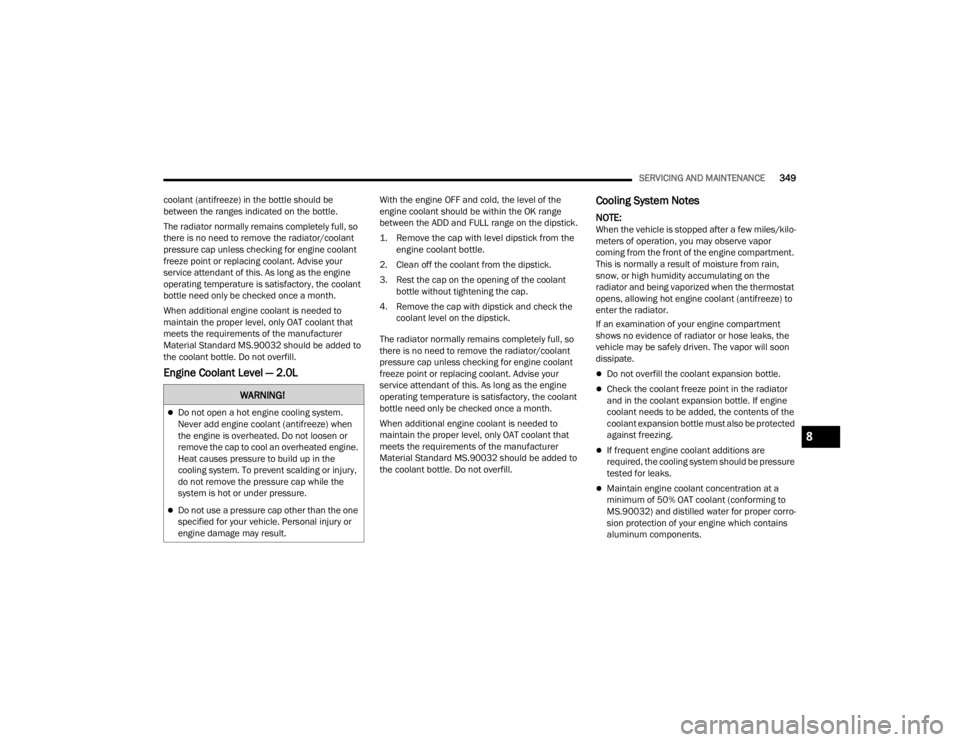
SERVICING AND MAINTENANCE349
coolant (antifreeze) in the bottle should be
between the ranges indicated on the bottle.
The radiator normally remains completely full, so
there is no need to remove the radiator/coolant
pressure cap unless checking for engine coolant
freeze point or replacing coolant. Advise your
service attendant of this. As long as the engine
operating temperature is satisfactory, the coolant
bottle need only be checked once a month.
When additional engine coolant is needed to
maintain the proper level, only OAT coolant that
meets the requirements of the manufacturer
Material Standard MS.90032 should be added to
the coolant bottle. Do not overfill.
Engine Coolant Level — 2.0L
With the engine OFF and cold, the level of the
engine coolant should be within the OK range
between the ADD and FULL range on the dipstick.
1. Remove the cap with level dipstick from the engine coolant bottle.
2. Clean off the coolant from the dipstick.
3. Rest the cap on the opening of the coolant bottle without tightening the cap.
4. Remove the cap with dipstick and check the coolant level on the dipstick.
The radiator normally remains completely full, so
there is no need to remove the radiator/coolant
pressure cap unless checking for engine coolant
freeze point or replacing coolant. Advise your
service attendant of this. As long as the engine
operating temperature is satisfactory, the coolant
bottle need only be checked once a month.
When additional engine coolant is needed to
maintain the proper level, only OAT coolant that
meets the requirements of the manufacturer
Material Standard MS.90032 should be added to
the coolant bottle. Do not overfill.Cooling System Notes
NOTE:When the vehicle is stopped after a few miles/kilo -
meters of operation, you may observe vapor
coming from the front of the engine compartment.
This is normally a result of moisture from rain,
snow, or high humidity accumulating on the
radiator and being vaporized when the thermostat
opens, allowing hot engine coolant (antifreeze) to
enter the radiator.
If an examination of your engine compartment
shows no evidence of radiator or hose leaks, the
vehicle may be safely driven. The vapor will soon
dissipate.
Do not overfill the coolant expansion bottle.
Check the coolant freeze point in the radiator
and in the coolant expansion bottle. If engine
coolant needs to be added, the contents of the
coolant expansion bottle must also be protected
against freezing.
If frequent engine coolant additions are
required, the cooling system should be pressure
tested for leaks.
Maintain engine coolant concentration at a
minimum of 50% OAT coolant (conforming to
MS.90032) and distilled water for proper corro -
sion protection of your engine which contains
aluminum components.
WARNING!
Do not open a hot engine cooling system.
Never add engine coolant (antifreeze) when
the engine is overheated. Do not loosen or
remove the cap to cool an overheated engine.
Heat causes pressure to build up in the
cooling system. To prevent scalding or injury,
do not remove the pressure cap while the
system is hot or under pressure.
Do not use a pressure cap other than the one
specified for your vehicle. Personal injury or
engine damage may result.
8
23_WL_OM_EN_USC_t.book Page 349
Page 352 of 424
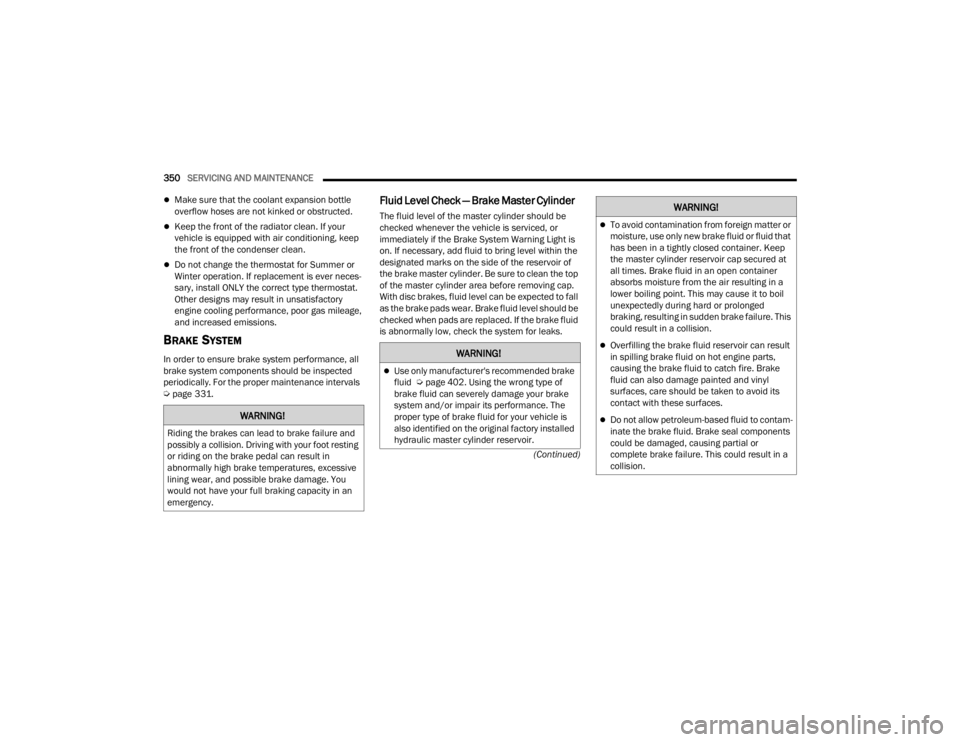
350SERVICING AND MAINTENANCE
(Continued)
Make sure that the coolant expansion bottle
overflow hoses are not kinked or obstructed.
Keep the front of the radiator clean. If your
vehicle is equipped with air conditioning, keep
the front of the condenser clean.
Do not change the thermostat for Summer or
Winter operation. If replacement is ever neces-
sary, install ONLY the correct type thermostat.
Other designs may result in unsatisfactory
engine cooling performance, poor gas mileage,
and increased emissions.
BRAKE SYSTEM
In order to ensure brake system performance, all
brake system components should be inspected
periodically. For the proper maintenance intervals
Ú page 331.
Fluid Level Check — Brake Master Cylinder
The fluid level of the master cylinder should be
checked whenever the vehicle is serviced, or
immediately if the Brake System Warning Light is
on. If necessary, add fluid to bring level within the
designated marks on the side of the reservoir of
the brake master cylinder. Be sure to clean the top
of the master cylinder area before removing cap.
With disc brakes, fluid level can be expected to fall
as the brake pads wear. Brake fluid level should be
checked when pads are replaced. If the brake fluid
is abnormally low, check the system for leaks.
WARNING!
Riding the brakes can lead to brake failure and
possibly a collision. Driving with your foot resting
or riding on the brake pedal can result in
abnormally high brake temperatures, excessive
lining wear, and possible brake damage. You
would not have your full braking capacity in an
emergency.
WARNING!
Use only manufacturer's recommended brake
fluid Ú page 402. Using the wrong type of
brake fluid can severely damage your brake
system and/or impair its performance. The
proper type of brake fluid for your vehicle is
also identified on the original factory installed
hydraulic master cylinder reservoir.
To avoid contamination from foreign matter or
moisture, use only new brake fluid or fluid that
has been in a tightly closed container. Keep
the master cylinder reservoir cap secured at
all times. Brake fluid in an open container
absorbs moisture from the air resulting in a
lower boiling point. This may cause it to boil
unexpectedly during hard or prolonged
braking, resulting in sudden brake failure. This
could result in a collision.
Overfilling the brake fluid reservoir can result
in spilling brake fluid on hot engine parts,
causing the brake fluid to catch fire. Brake
fluid can also damage painted and vinyl
surfaces, care should be taken to avoid its
contact with these surfaces.
Do not allow petroleum-based fluid to contam -
inate the brake fluid. Brake seal components
could be damaged, causing partial or
complete brake failure. This could result in a
collision.
WARNING!
23_WL_OM_EN_USC_t.book Page 350
Page 353 of 424
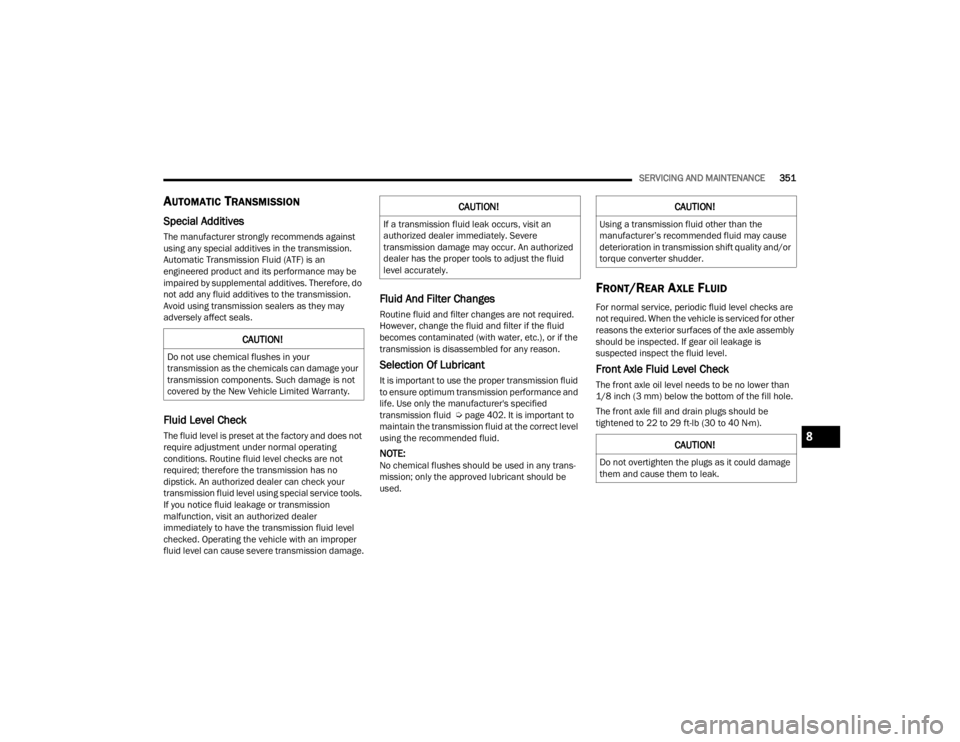
SERVICING AND MAINTENANCE351
AUTOMATIC TRANSMISSION
Special Additives
The manufacturer strongly recommends against
using any special additives in the transmission.
Automatic Transmission Fluid (ATF) is an
engineered product and its performance may be
impaired by supplemental additives. Therefore, do
not add any fluid additives to the transmission.
Avoid using transmission sealers as they may
adversely affect seals.
Fluid Level Check
The fluid level is preset at the factory and does not
require adjustment under normal operating
conditions. Routine fluid level checks are not
required; therefore the transmission has no
dipstick. An authorized dealer can check your
transmission fluid level using special service tools.
If you notice fluid leakage or transmission
malfunction, visit an authorized dealer
immediately to have the transmission fluid level
checked. Operating the vehicle with an improper
fluid level can cause severe transmission damage.
Fluid And Filter Changes
Routine fluid and filter changes are not required.
However, change the fluid and filter if the fluid
becomes contaminated (with water, etc.), or if the
transmission is disassembled for any reason.
Selection Of Lubricant
It is important to use the proper transmission fluid
to ensure optimum transmission performance and
life. Use only the manufacturer's specified
transmission fluid Úpage 402. It is important to
maintain the transmission fluid at the correct level
using the recommended fluid.
NOTE:No chemical flushes should be used in any trans -
mission; only the approved lubricant should be
used.
FRONT/REAR AXLE FLUID
For normal service, periodic fluid level checks are
not required. When the vehicle is serviced for other
reasons the exterior surfaces of the axle assembly
should be inspected. If gear oil leakage is
suspected inspect the fluid level.
Front Axle Fluid Level Check
The front axle oil level needs to be no lower than
1/8 inch (3 mm) below the bottom of the fill hole.
The front axle fill and drain plugs should be
tightened to 22 to 29 ft-lb (30 to 40 N·m).
CAUTION!
Do not use chemical flushes in your
transmission as the chemicals can damage your
transmission components. Such damage is not
covered by the New Vehicle Limited Warranty.
CAUTION!
If a transmission fluid leak occurs, visit an
authorized dealer immediately. Severe
transmission damage may occur. An authorized
dealer has the proper tools to adjust the fluid
level accurately.
CAUTION!
Using a transmission fluid other than the
manufacturer’s recommended fluid may cause
deterioration in transmission shift quality and/or
torque converter shudder.
CAUTION!
Do not overtighten the plugs as it could damage
them and cause them to leak.
8
23_WL_OM_EN_USC_t.book Page 351
Page 354 of 424
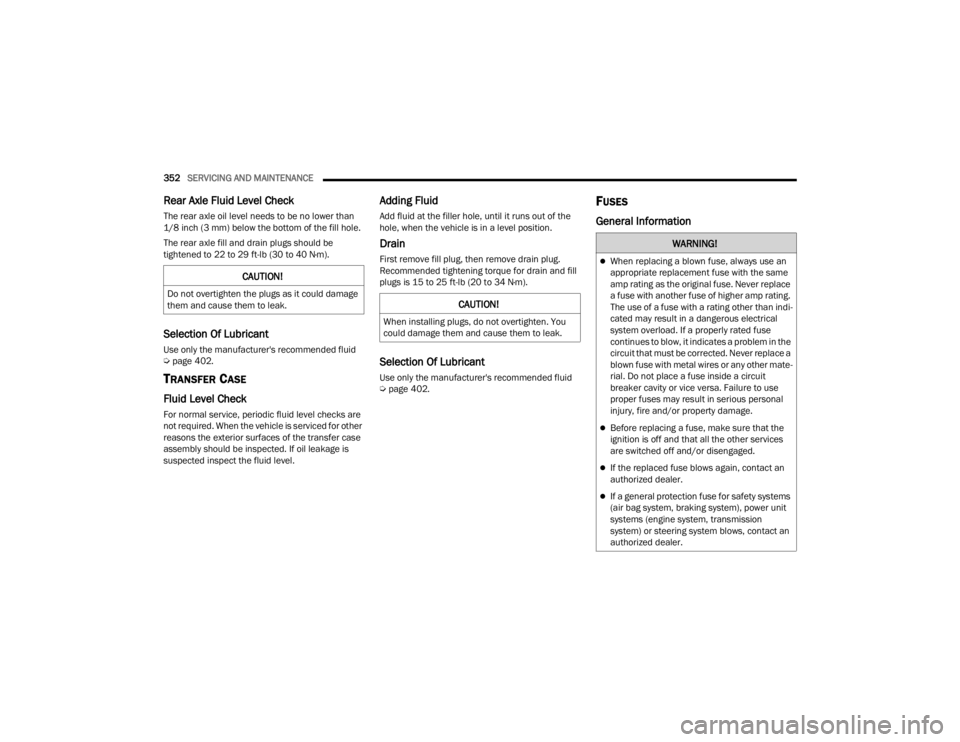
352SERVICING AND MAINTENANCE
Rear Axle Fluid Level Check
The rear axle oil level needs to be no lower than
1/8 inch (3 mm) below the bottom of the fill hole.
The rear axle fill and drain plugs should be
tightened to 22 to 29 ft-lb (30 to 40 N·m).
Selection Of Lubricant
Use only the manufacturer's recommended fluid
Úpage 402.
TRANSFER CASE
Fluid Level Check
For normal service, periodic fluid level checks are
not required. When the vehicle is serviced for other
reasons the exterior surfaces of the transfer case
assembly should be inspected. If oil leakage is
suspected inspect the fluid level.
Adding Fluid
Add fluid at the filler hole, until it runs out of the
hole, when the vehicle is in a level position.
Drain
First remove fill plug, then remove drain plug.
Recommended tightening torque for drain and fill
plugs is 15 to 25 ft-lb (20 to 34 N·m).
Selection Of Lubricant
Use only the manufacturer's recommended fluid
Úpage 402.
FUSES
General Information
CAUTION!
Do not overtighten the plugs as it could damage
them and cause them to leak.CAUTION!
When installing plugs, do not overtighten. You
could damage them and cause them to leak.
WARNING!
When replacing a blown fuse, always use an
appropriate replacement fuse with the same
amp rating as the original fuse. Never replace
a fuse with another fuse of higher amp rating.
The use of a fuse with a rating other than indi -
cated may result in a dangerous electrical
system overload. If a properly rated fuse
continues to blow, it indicates a problem in the
circuit that must be corrected. Never replace a
blown fuse with metal wires or any other mate -
rial. Do not place a fuse inside a circuit
breaker cavity or vice versa. Failure to use
proper fuses may result in serious personal
injury, fire and/or property damage.
Before replacing a fuse, make sure that the
ignition is off and that all the other services
are switched off and/or disengaged.
If the replaced fuse blows again, contact an
authorized dealer.
If a general protection fuse for safety systems
(air bag system, braking system), power unit
systems (engine system, transmission
system) or steering system blows, contact an
authorized dealer.
23_WL_OM_EN_USC_t.book Page 352
Page 355 of 424
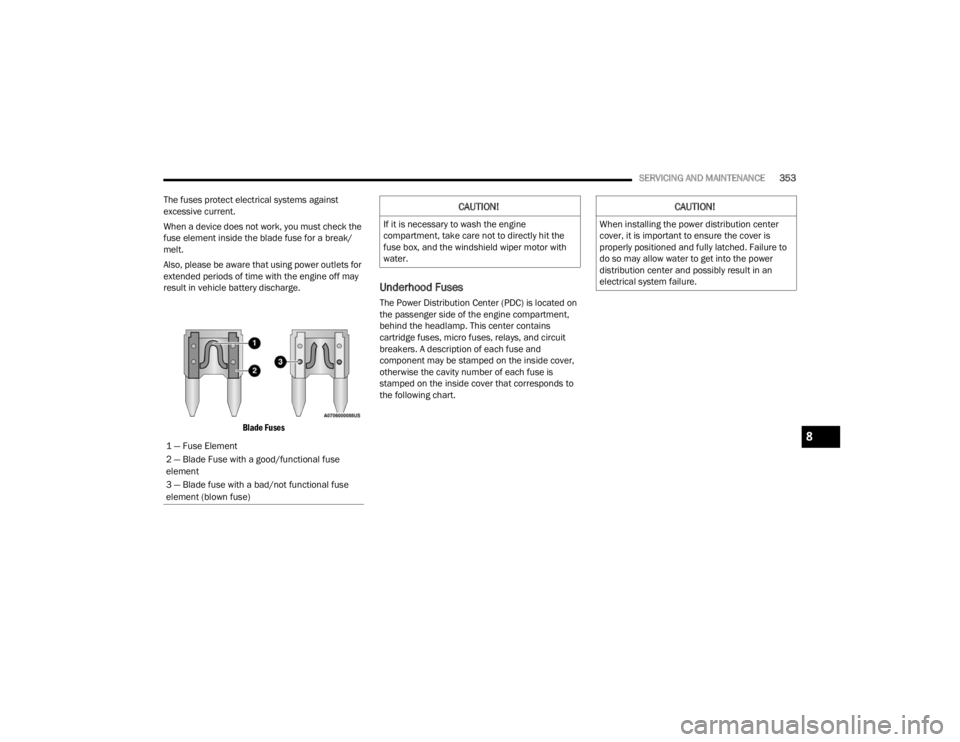
SERVICING AND MAINTENANCE353
The fuses protect electrical systems against
excessive current.
When a device does not work, you must check the
fuse element inside the blade fuse for a break/
melt.
Also, please be aware that using power outlets for
extended periods of time with the engine off may
result in vehicle battery discharge.
Blade Fuses
Underhood Fuses
The Power Distribution Center (PDC) is located on
the passenger side of the engine compartment,
behind the headlamp. This center contains
cartridge fuses, micro fuses, relays, and circuit
breakers. A description of each fuse and
component may be stamped on the inside cover,
otherwise the cavity number of each fuse is
stamped on the inside cover that corresponds to
the following chart.
1 — Fuse Element
2 — Blade Fuse with a good/functional fuse
element
3 — Blade fuse with a bad/not functional fuse
element (blown fuse)
CAUTION!
If it is necessary to wash the engine
compartment, take care not to directly hit the
fuse box, and the windshield wiper motor with
water.
CAUTION!
When installing the power distribution center
cover, it is important to ensure the cover is
properly positioned and fully latched. Failure to
do so may allow water to get into the power
distribution center and possibly result in an
electrical system failure.
8
23_WL_OM_EN_USC_t.book Page 353
Page 399 of 424
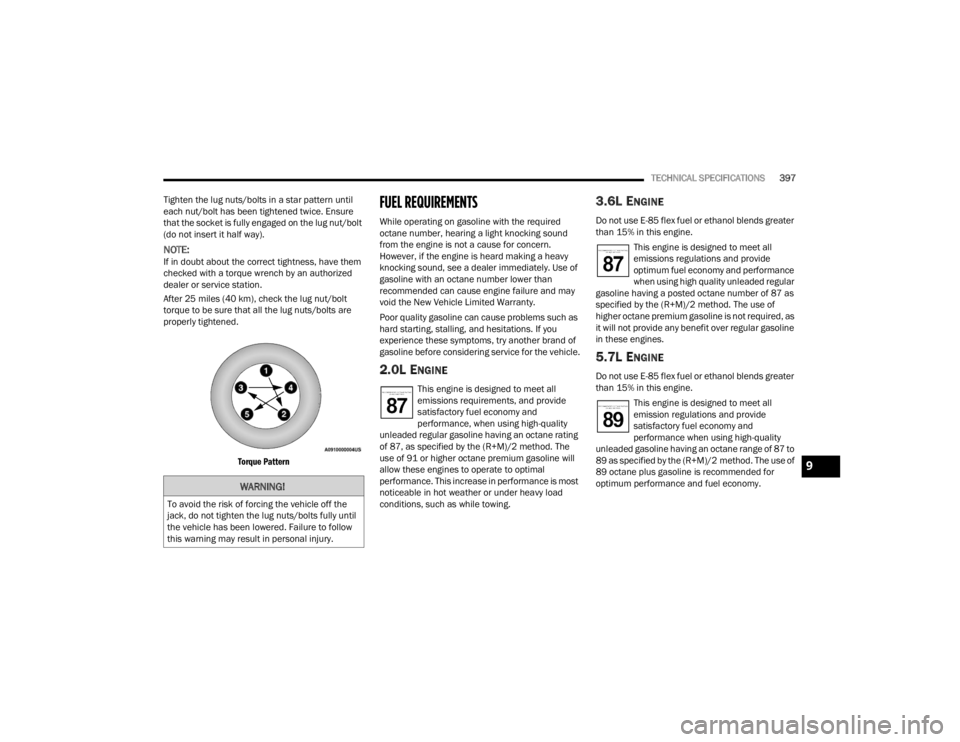
TECHNICAL SPECIFICATIONS397
Tighten the lug nuts/bolts in a star pattern until
each nut/bolt has been tightened twice. Ensure
that the socket is fully engaged on the lug nut/bolt
(do not insert it half way).
NOTE:If in doubt about the correct tightness, have them
checked with a torque wrench by an authorized
dealer or service station.
After 25 miles (40 km), check the lug nut/bolt
torque to be sure that all the lug nuts/bolts are
properly tightened.
Torque Pattern
FUEL REQUIREMENTS
While operating on gasoline with the required
octane number, hearing a light knocking sound
from the engine is not a cause for concern.
However, if the engine is heard making a heavy
knocking sound, see a dealer immediately. Use of
gasoline with an octane number lower than
recommended can cause engine failure and may
void the New Vehicle Limited Warranty.
Poor quality gasoline can cause problems such as
hard starting, stalling, and hesitations. If you
experience these symptoms, try another brand of
gasoline before considering service for the vehicle.
2.0L ENGINE
This engine is designed to meet all
emissions requirements, and provide
satisfactory fuel economy and
performance, when using high-quality
unleaded regular gasoline having an octane rating
of 87, as specified by the (R+M)/2 method. The
use of 91 or higher octane premium gasoline will
allow these engines to operate to optimal
performance. This increase in performance is most
noticeable in hot weather or under heavy load
conditions, such as while towing.
3.6L ENGINE
Do not use E-85 flex fuel or ethanol blends greater
than 15% in this engine.
This engine is designed to meet all
emissions regulations and provide
optimum fuel economy and performance
when using high quality unleaded regular
gasoline having a posted octane number of 87 as
specified by the (R+M)/2 method. The use of
higher octane premium gasoline is not required, as
it will not provide any benefit over regular gasoline
in these engines.
5.7L ENGINE
Do not use E-85 flex fuel or ethanol blends greater
than 15% in this engine.
This engine is designed to meet all
emission regulations and provide
satisfactory fuel economy and
performance when using high-quality
unleaded gasoline having an octane range of 87 to
89 as specified by the (R+M)/2 method. The use of
89 octane plus gasoline is recommended for
optimum performance and fuel economy.
WARNING!
To avoid the risk of forcing the vehicle off the
jack, do not tighten the lug nuts/bolts fully until
the vehicle has been lowered. Failure to follow
this warning may result in personal injury.
9
23_WL_OM_EN_USC_t.book Page 397
Page 412 of 424
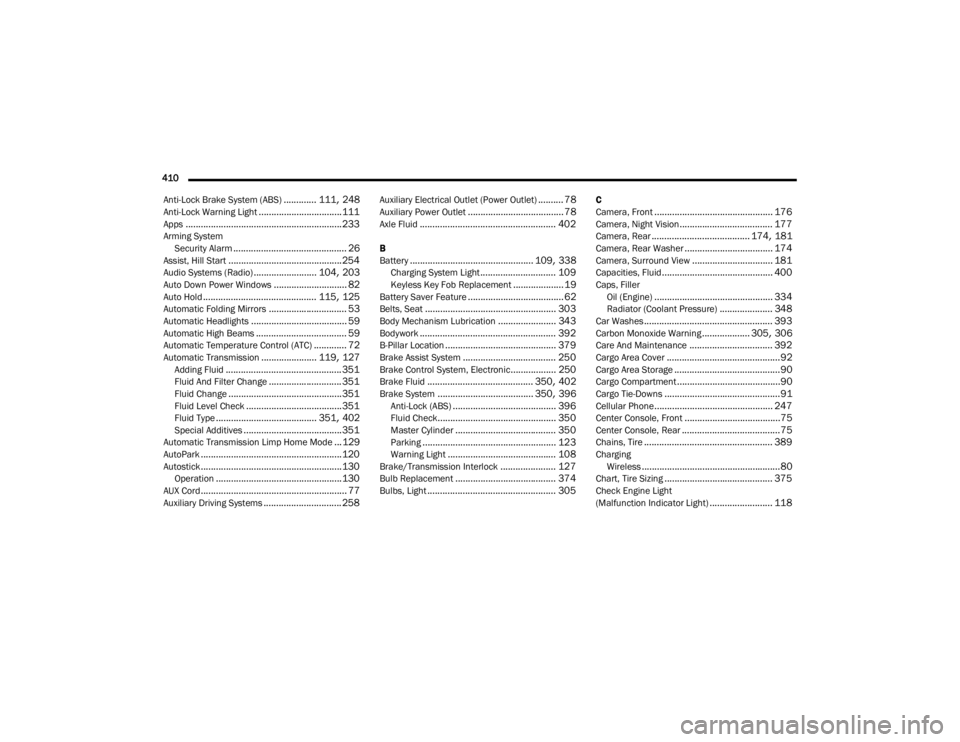
410 Anti-Lock Brake System (ABS)
............. 111, 248Anti-Lock Warning Light................................. 111Apps.............................................................. 233Arming System Security Alarm............................................. 26Assist, Hill Start............................................. 254Audio Systems (Radio)......................... 104, 203Auto Down Power Windows............................. 82Auto Hold............................................. 115, 125Automatic Folding Mirrors............................... 53Automatic Headlights...................................... 59Automatic High Beams.................................... 59Automatic Temperature Control (ATC)............. 72Automatic Transmission...................... 119, 127Adding Fluid.............................................. 351Fluid And Filter Change............................. 351Fluid Change............................................. 351Fluid Level Check...................................... 351Fluid Type........................................ 351, 402Special Additives....................................... 351Automatic Transmission Limp Home Mode... 129AutoPark........................................................ 120Autostick........................................................ 130Operation.................................................. 130AUX Cord.......................................................... 77Auxiliary Driving Systems............................... 258
Auxiliary Electrical Outlet (Power Outlet).......... 78Auxiliary Power Outlet...................................... 78Axle Fluid...................................................... 402
B
Battery................................................. 109, 338Charging System Light.............................. 109Keyless Key Fob Replacement.................... 19Battery Saver Feature...................................... 62Belts, Seat.................................................... 303Body Mechanism Lubrication....................... 343Bodywork...................................................... 392B-Pillar Location............................................ 379Brake Assist System..................................... 250Brake Control System, Electronic.................. 250Brake Fluid.......................................... 350, 402Brake System...................................... 350, 396Anti-Lock (ABS)......................................... 396Fluid Check............................................... 350Master Cylinder........................................ 350Parking..................................................... 123Warning Light........................................... 108Brake/Transmission Interlock...................... 127Bulb Replacement........................................ 374Bulbs, Light................................................... 305
C
Camera, Front............................................... 176Camera, Night Vision..................................... 177Camera, Rear....................................... 174, 181Camera, Rear Washer................................... 174Camera, Surround View................................ 181Capacities, Fluid............................................ 400Caps, FillerOil (Engine)............................................... 334Radiator (Coolant Pressure)..................... 348Car Washes................................................... 393Carbon Monoxide Warning................... 305, 306Care And Maintenance................................. 392Cargo Area Cover.............................................92Cargo Area Storage..........................................90Cargo Compartment.........................................90Cargo Tie-Downs..............................................91Cellular Phone............................................... 247Center Console, Front......................................75Center Console, Rear.......................................75Chains, Tire................................................... 389ChargingWireless.......................................................80Chart, Tire Sizing........................................... 375Check Engine Light
(Malfunction Indicator Light)......................... 118
23_WL_OM_EN_USC_t.book Page 410
Page 413 of 424
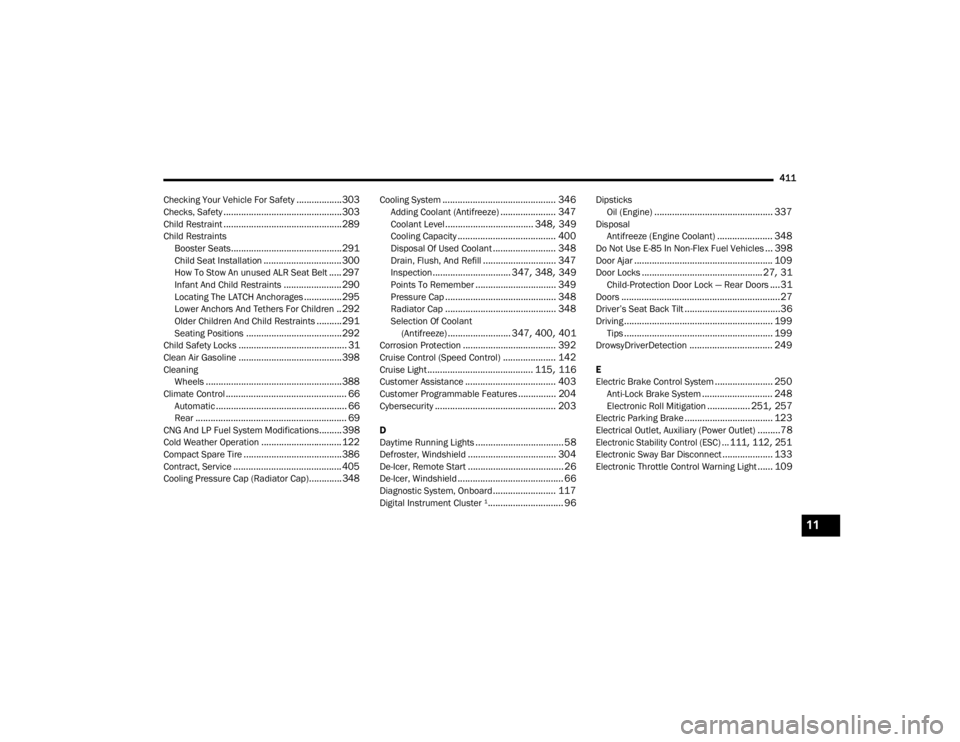
411
Checking Your Vehicle For Safety
.................. 303Checks, Safety............................................... 303Child Restraint............................................... 289Child Restraints Booster Seats............................................ 291Child Seat Installation............................... 300How To Stow An unused ALR Seat Belt..... 297Infant And Child Restraints....................... 290Locating The LATCH Anchorages............... 295Lower Anchors And Tethers For Children.. 292Older Children And Child Restraints..........291Seating Positions...................................... 292Child Safety Locks........................................... 31Clean Air Gasoline......................................... 398CleaningWheels...................................................... 388Climate Control................................................ 66Automatic.................................................... 66Rear............................................................ 69CNG And LP Fuel System Modifications......... 398Cold Weather Operation................................ 122Compact Spare Tire....................................... 386Contract, Service........................................... 405Cooling Pressure Cap (Radiator Cap).............348
Cooling System............................................. 346Adding Coolant (Antifreeze)...................... 347Coolant Level................................... 348, 349Cooling Capacity....................................... 400Disposal Of Used Coolant......................... 348Drain, Flush, And Refill............................. 347Inspection............................... 347, 348, 349Points To Remember................................ 349Pressure Cap............................................ 348Radiator Cap............................................ 348Selection Of Coolant(Antifreeze)......................... 347, 400, 401Corrosion Protection..................................... 392Cruise Control (Speed Control)..................... 142Cruise Light.......................................... 115, 116Customer Assistance.................................... 403Customer Programmable Features............... 204Cybersecurity................................................ 203
D
Daytime Running Lights................................... 58Defroster, Windshield................................... 304De-Icer, Remote Start...................................... 26De-Icer, Windshield.......................................... 66Diagnostic System, Onboard......................... 117Digital Instrument Cluster ¹.............................. 96
DipsticksOil (Engine)............................................... 337DisposalAntifreeze (Engine Coolant)...................... 348Do Not Use E-85 In Non-Flex Fuel Vehicles... 398Door Ajar....................................................... 109Door Locks................................................27, 31Child-Protection Door Lock — Rear Doors....31Doors...............................................................27Driver’s Seat Back Tilt......................................36Driving........................................................... 199Tips........................................................... 199DrowsyDriverDetection................................. 249
E
Electric Brake Control System....................... 250Anti-Lock Brake System............................ 248Electronic Roll Mitigation................. 251, 257Electric Parking Brake................................... 123Electrical Outlet, Auxiliary (Power Outlet).........78
Electronic Stability Control (ESC)... 111, 112, 251
Electronic Sway Bar Disconnect.................... 133Electronic Throttle Control Warning Light...... 109
11
23_WL_OM_EN_USC_t.book Page 411
Page 414 of 424
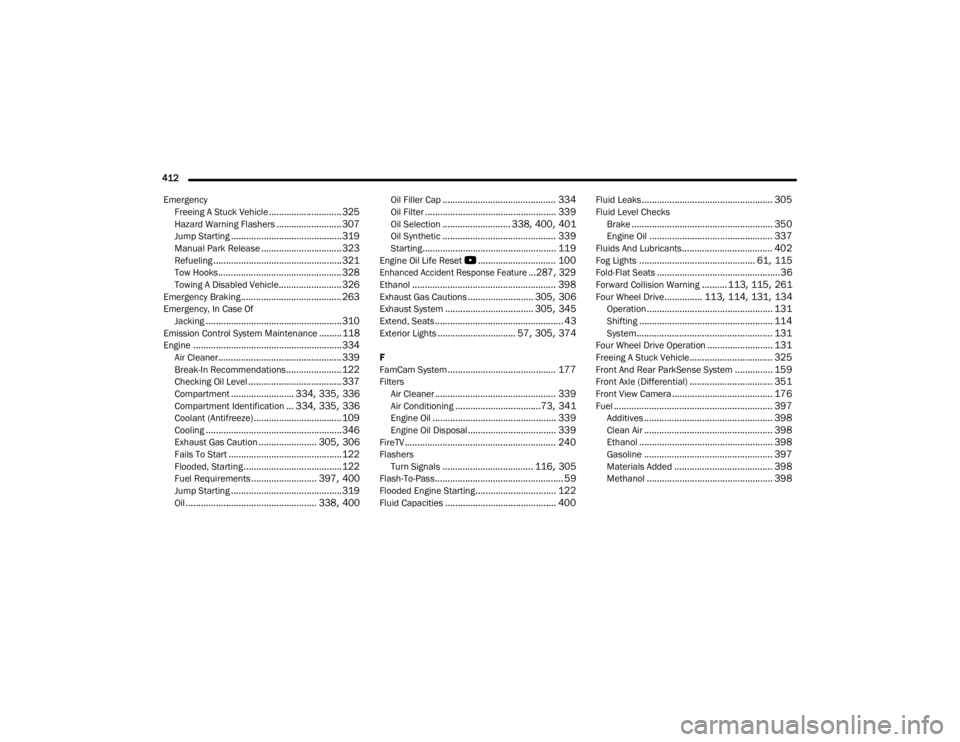
412 Emergency Freeing A Stuck Vehicle
............................. 325Hazard Warning Flashers.......................... 307Jump Starting............................................ 319Manual Park Release................................ 323Refueling................................................... 321Tow Hooks................................................. 328Towing A Disabled Vehicle......................... 326Emergency Braking........................................ 263Emergency, In Case OfJacking...................................................... 310Emission Control System Maintenance......... 118Engine........................................................... 334Air Cleaner................................................. 339Break-In Recommendations...................... 122Checking Oil Level..................................... 337Compartment......................... 334, 335, 336Compartment Identification... 334, 335, 336Coolant (Antifreeze)................................... 109Cooling...................................................... 346Exhaust Gas Caution....................... 305, 306Fails To Start............................................. 122Flooded, Starting....................................... 122Fuel Requirements.......................... 397, 400Jump Starting............................................ 319Oil.................................................... 338, 400
Oil Filler Cap............................................. 334Oil Filter.................................................... 339Oil Selection........................... 338, 400, 401Oil Synthetic............................................. 339Starting..................................................... 119Engine Oil Life Reset
b
............................... 100
Enhanced Accident Response Feature...287, 329
Ethanol......................................................... 398Exhaust Gas Cautions.......................... 305, 306Exhaust System................................... 305, 345Extend, Seats................................................... 43Exterior Lights............................... 57, 305, 374
F
FamCam System........................................... 177FiltersAir Cleaner................................................ 339Air Conditioning..................................73, 341Engine Oil................................................. 339Engine Oil Disposal................................... 339FireTV............................................................ 240FlashersTurn Signals.................................... 116, 305Flash-To-Pass................................................... 59Flooded Engine Starting................................ 122Fluid Capacities............................................ 400
Fluid Leaks.................................................... 305Fluid Level ChecksBrake........................................................ 350Engine Oil................................................. 337Fluids And Lubricants.................................... 402Fog Lights.............................................. 61, 115Fold-Flat Seats.................................................36Forward Collision Warning.......... 113, 115, 261Four Wheel Drive............... 113, 114, 131, 134Operation.................................................. 131Shifting..................................................... 114System...................................................... 131Four Wheel Drive Operation.......................... 131Freeing A Stuck Vehicle................................. 325Front And Rear ParkSense System............... 159Front Axle (Differential)................................. 351Front View Camera........................................ 176Fuel............................................................... 397Additives................................................... 398Clean Air................................................... 398Ethanol..................................................... 398Gasoline................................................... 397Materials Added....................................... 398Methanol.................................................. 398
23_WL_OM_EN_USC_t.book Page 412
Page 416 of 424
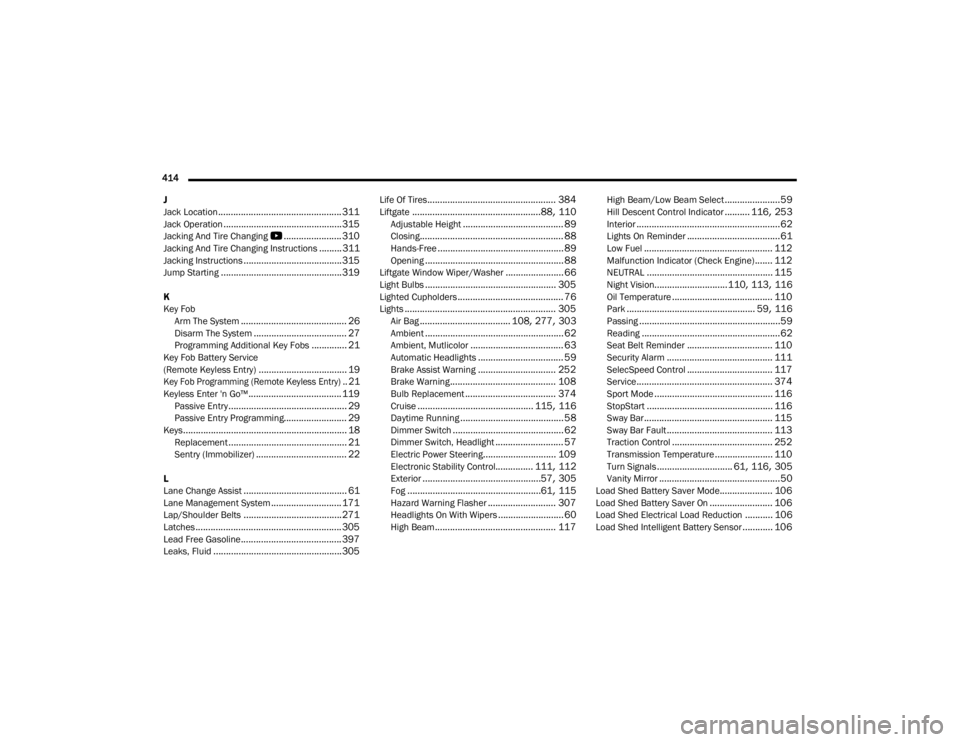
414 J
Jack Location
................................................. 311Jack Operation............................................... 315Jacking And Tire Changing
b
....................... 310Jacking And Tire Changing Instructions......... 311Jacking Instructions....................................... 315Jump Starting................................................ 319
K
Key Fob Arm The System
.......................................... 26Disarm The System..................................... 27Programming Additional Key Fobs.............. 21Key Fob Battery Service
(Remote Keyless Entry)................................... 19
Key Fob Programming (Remote Keyless Entry).. 21
Keyless Enter 'n Go™..................................... 119Passive Entry............................................... 29Passive Entry Programming......................... 29Keys................................................................. 18Replacement............................................... 21Sentry (Immobilizer).................................... 22
L
Lane Change Assist......................................... 61Lane Management System............................ 171Lap/Shoulder Belts....................................... 271Latches.......................................................... 305Lead Free Gasoline........................................ 397Leaks, Fluid................................................... 305
Life Of Tires................................................... 384Liftgate...................................................88, 110Adjustable Height........................................ 89Closing......................................................... 88Hands-Free.................................................. 89Opening....................................................... 88Liftgate Window Wiper/Washer....................... 66Light Bulbs.................................................... 305Lighted Cupholders.......................................... 76Lights............................................................ 305Air Bag.................................... 108, 277, 303Ambient....................................................... 62Ambient, Mutlicolor..................................... 63Automatic Headlights.................................. 59Brake Assist Warning............................... 252Brake Warning.......................................... 108Bulb Replacement.................................... 374Cruise.............................................. 115, 116Daytime Running......................................... 58Dimmer Switch............................................ 62Dimmer Switch, Headlight........................... 57Electric Power Steering............................. 109Electronic Stability Control............... 111, 112Exterior...............................................57, 305Fog.....................................................61, 115Hazard Warning Flasher........................... 307Headlights On With Wipers.......................... 60High Beam................................................ 117
High Beam/Low Beam Select......................59Hill Descent Control Indicator.......... 116, 253Interior.........................................................62Lights On Reminder.....................................61Low Fuel................................................... 112Malfunction Indicator (Check Engine)....... 112NEUTRAL.................................................. 115Night Vision.............................110, 113, 116Oil Temperature........................................ 110Park................................................... 59, 116Passing........................................................59Reading.......................................................62Seat Belt Reminder.................................. 110Security Alarm.......................................... 111SelecSpeed Control.................................. 117Service...................................................... 374Sport Mode............................................... 116StopStart.................................................. 116Sway Bar................................................... 115Sway Bar Fault.......................................... 113Traction Control........................................ 252Transmission Temperature....................... 110Turn Signals.............................. 61, 116, 305Vanity Mirror................................................50Load Shed Battery Saver Mode..................... 106Load Shed Battery Saver On......................... 106Load Shed Electrical Load Reduction........... 106Load Shed Intelligent Battery Sensor............ 106
23_WL_OM_EN_USC_t.book Page 414